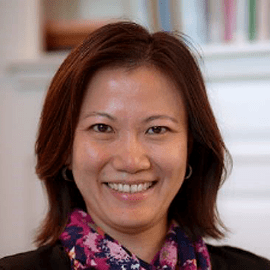
Challenging “Otherness”: Female Immigrant Faculty in the U.S. and Their Struggle to Adapt
As the topic of immigration gains traction in both Communication research and the current political climate, researchers Yea-Wen Chen and Brandi Lawless have added to their previous research on academia and immigration with a new article focused on female immigrant faculty. In NCA’s Journal of International and Intercultural Communication, Chen and Lawless examine paradoxes of adaptation and strategic ambiguity within this demographic, using the results of interviews with 26 individuals from various academic fields and ranks, from 15 different countries, and with varying immigrant status. Their research explored whether female immigrant faculty make or are expected to enact micro/macro adaptations which “paradoxically can function to further disorient, alienate, or marginalize them.”
The authors note up front that immigrant faculty are required to “adapt to U.S. social, cultural, and educational systems,” and that this expectation is heightened for women, especially women of color. Further, the burden for adaptation mainly falls on “cultural others,” and Chen and Lawless suggest an alternate theory, that of differential adaptation, which “understands immigrants’ diverse and stratified experiences, their…pressures to assimilate, and their potentials to reshape subjectivities and social norms.” They believe that this theory provides a framework for understanding the various ways immigrants adapt to their adopted society based on multiple dynamics and conditions, and that differential adaptation recognizes that “immigrants may affirm their identities and actively seek opportunities to transform their new society rather than just assimilating to it.”
Female Immigrant Faculty Challenges
While most of the women who participated in the study recognize that they are “privileged immigrants,” they also note their disadvantaged positions as “the raced and gendered immigrant others.” Within this category, some of the women face more discrimination and microaggressions than others, depending on their skin color, accent, and their native country. The authors call out a “hierarchy of accents” that enforces race, Western European-ness, and body politics.
Further, the authors state that “Whiteness, racism, and differential racialization penetrate the experiences of immigrant women faculty in our study.” A white, Canadian scholar acknowledged playing that “card” to obtain a higher status as compared with a black, African woman who battles the racial stereotype of the “angry black woman.” According to Chen and Lawless, “Many immigrant women of color (re)learned to locate, negotiate, and navigate their particular racial identity in the U.S.”
Intersectionality means a lot to me…when you ask me what it is like to be an immigrant woman in academia, I cannot answer with one particular way because it is so multifold.
Beyond race, immigrant women faculty experienced otherness based on other identity positions, such as gender, sexual orientation, and political ideology. “…Intersecting identity positions, though emerging in various configurations between and across the immigrant women, mark their bodies as different, foreign, un-related, indecipherable, and othered.”
Navigating Paradoxes of “Adaptation”

A common theme in the participants’ stories was the complex process of navigating the U.S. academic and immigration systems, “both wrought with ambiguity, stress, and fear.” In addition to dealing with logistics and paperwork, adapting to U.S. society and culture creates additional pressure for female immigrant faculty, leading to further marginalization. One example was a Japanese woman who recorded her lectures to listen to her accent. When she realized students were mocking her, she switched gears and began speaking in Japanese in the middle of the lecture to make a point. This response “further distanced her from some students, sacrificing teacher immediacy and student-teacher rapport.”
When one participant’s mentor told her after some time that she had become so “Americanized” – as evidenced by her personality changing from “mellow” to “aggressive,” the woman began to question her identity.
Oh my god! You have become so Americanized!
Several participant anecdotes led the authors to note that while adaptation may help improve the faculty members’ teacher evaluations, it also “further marginalizes and alienates them with regards to self-identification.” Adaptation can ease stress and help immigrant women fit in, but it also “perpetuates colorblind ideologies, accepts racism and discrimination, and assumes that immigrant voices and experiences are inferior.”
The authors also examined how the participants used “strategic ambiguity,” or vague messages that are deployed intentionally to reorient and resist expectations, as a rhetorical device for avoiding confrontation and asserting interests. When participants claimed they “didn’t know the rules” or really owned their identity as an immigrant to allow room for their beliefs, behaviors, and interests, they challenged expectations to “create room for individual and academic freedom.”
Employing “Micro/macro-adaptation” Strategies
Chen and Lawless suggest that female immigrant faculty use the micro/macro-adaptation approach to combat some of the challenges they face in the United States. Examples include “using silence, changing or maintaining physical appearance, making attitudinal adjustments, opting out, learning or resisting the “standard” American accent, and deploying strategic ambiguity.” However, they acknowledge that this approach also can encourage immigrants to hyper-adapt, when they are already expected to work doubly hard and exceed expectations. Yet the authors believe that micro/macro-adaptation would make “implicit expectations, norms, and standards for adaptations explicit so as to encourage greater conversations about immigration discourses with communication studies.”
Ultimately, Chen and Lawless recognize that their small research sample prohibits them from making specific conclusions on cultural/national similarities and differences, or about higher education writ large. They suggest future studies that include work with LGBTQ immigrants, refugees, and other marginalized groups. As immigration becomes an increasingly high-priority topic in the academy and in our world, the authors contend that there should be more attention given to the “unique struggles of immigrant faculty’s adaptations.”



